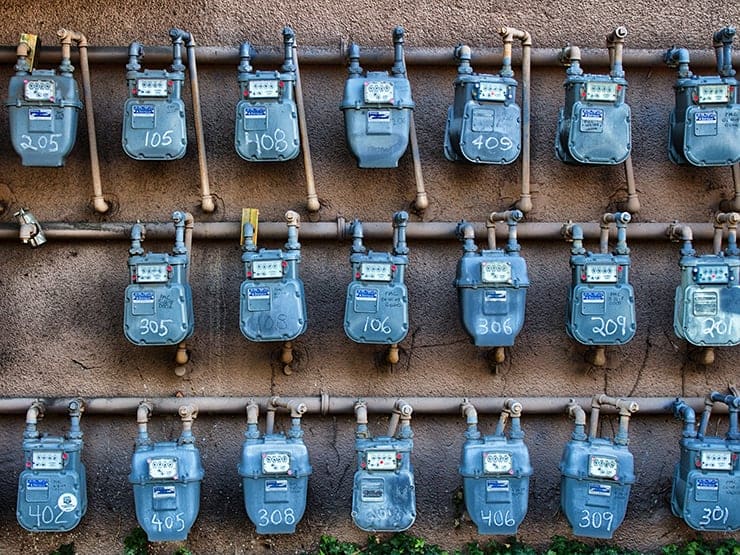“Cliff Walk – Newport, Rhode Island, USA” by Giorgio Galeotti is licensed under CC BY-4.0
How Much Does it Cost to Live the FIRE Life in Newport?
Hello, and welcome to interview #28 in the How Much Does it Cost to Live the FIRE Life interview series! Part interview, part spending report, this series will introduce us to FIRE* seekers from all over the world.
They’ll reveal their essential spending and money-saving tips—all to help us learn new ways to save on our own expenses. As a bonus, we’ll also get to discover the unique advantages and challenges of living in different places around the globe.
*FIRE stands for financial independence, retire early. It’s also known as FI—financial independence. For more info, see my FI School series—it’ll teach you everything you need to know about FI (and FIRE).
About the interview series
I created an intro page for this interview series to help explain what it’s about, what’s included (or not) and why. I’ll also link to all the interviews from the intro page—so check back there to see the entire collection.
Jump to the series intro: How Much Does it Cost to Live the FIRE Life? (The Interview Series)
Disclosure: These interviews may include affiliate links. That means I’ll receive a commission if you make a purchase through my links—at no extra cost to you. Thank you!
Interview #29: Brian from Newport
In today’s interview, we’ll meet Brian from the Lazy Man and Money blog. Brian lives in historic Newport, Rhode Island (an area known for its Gilded Age mansions). He and I interacted a few times on Twitter, and after reading my About Me page, he realized how much we had in common!
- He and my husband both have classic red Mustangs (his is a 2001, and my husband’s is a 1965).
- We have a Shiba Inu, and he has a husky/chow/yellow lab that everyone thinks is a big Shiba Inu.
- We both have two boys that are about two years apart.
- We have an interest in Japan.
I love that blogging brings about these random, meaningful connections with like-minded people. Even better—through this interview series, I also get to introduce these amazing people to you!
About Lazy Man and Money
At Lazy Man and Money, Brian writes about a wide variety of topics, including personal finance, investing, retirement planning, parenting, and more. (And wow, is he ever prolific—he posts about twice a week!)
Shockingly, Brian has been blogging at Lazy Man and Money since May 2006. That’s an eternity for a blog! I enjoy the friendly, conversational tone in Brian’s writing and am slowly making my way through the archives. (There’s a lot of great content there!)
As if running one blog wasn’t enough work, Brian also started a new blog called Kid Wealth, “where kids and parents learn about money.” While it’s only been around since December, Brian’s already written quite a few posts—and they’re all good!
Between Lazy Man and Money and Kid Wealth, you’ll have plenty of helpful, educational content to keep you entertained and learning for weeks on end. I hope you enjoy Brian’s content, but before you leave to check out his blogs, get to know a little more about him in his interview with me…
Table of Contents
Part 1
Part 2
Part 3
Part 4
Part 1: Getting to know you

Brian from the blog, “Lazy Man and Money”
Tell us about you and your family
We’re a family of five… or ten depending on the day. My wife and I are 46 years old. We have 8 and 9-year-old boys. We have a dog, Jake. I run a dog boarding business where we have up to 5 other dogs at our house at a time.
My wife’s a pharmacist in the military, which pays well. I used to be a software engineer, but I got burned out. I spend my day managing the kids, two blogs, Lazy Man and Money and Kid Wealth, the dog boarding business, and customer service at a small Silicon Valley start-up. My Lazy Man and Money blog turns 16 years old this year. I started Kid Wealth this year as I have started to turn my attention to the second generation of FIRE.
We both manage three rental properties. My wife does two-thirds of the work and I do the remaining third.
Where are you in your journey to FIRE?
We’re clearly not retired early for the RE. I would say that we are FI, but it’s complicated.
We have a high net worth, but it’s tied up in retirement accounts and real estate equity. It’s hard to use that money without penalties. Because we are working, we don’t need to access that money. However, we could quit, make some money moves to get to the money and be fine. Some may not consider us completely FI because we choose some extra luxuries while we are working. I have more to say about that later.
What type of FIRE are you aiming for? (FIRE, Lean FIRE, or Fat FIRE*)
How Chrissy defines FIRE, Lean FIRE, and Fat FIRE
Some people define Lean FIRE as under $40k in annual spending; FIRE as $40–$100k in annual spending; and Fat FIRE as $100k+ in annual spending.
However, I prefer looser definitions that are not based on hard numbers. That’s because $100k could be Fat FIRE in a small Canadian town but Lean FIRE in San Francisco. That said, here are my definitions:
- Lean FIRE: The essentials with little or no discretionary spending.
- FIRE: The essentials plus a comfortable amount of discretionary spending.
- Fat FIRE: The essentials plus a luxurious amount of discretionary spending.
It would be Fat FIRE, by almost any reasonable definition.
We should have $250k–$300k of income a year in retirement from all sources. If we use a 4% withdrawal rate from our equities, we have $65,000 a year in income. That should grow to at least $110,000–$125,000 by the time we are age 65.
We’ll also make $30,000 from rental income from our real estate. My wife’s military pension is vested and is worth $65,000/yr. I anticipate continuing my websites and dog sitting, though I may cut back on both. We also expect to have some Social Security income.
Tell us about your living situation
We have a mortgage on a single family home (3 beds, 2.5 baths, about 1,800 square feet, half acre of land). We bought it in 2011 for $400,000, but with the market nowadays it would go for $775,000.
We got a 15-year mortgage, so we are paying more every month to eliminate this expense in 2026. For reports like this, our expenses may appear higher, but we could refinance the remaining loan to a very low payment. It’s another reason why we consider ourselves FI even if we don’t match the typical definition.
Newport is a suburb, it’s hard to get around without a car. There is a little public transportation, but I don’t know or use the bus routes. I don’t bike, but Newport is very bike-friendly. Most of the things we need are within a couple of miles, so I don’t use a lot of gas.
Why did you choose to live in Newport?
Rhode Island is close enough to our extended family while still being far enough away that they can’t just drop in (about a 90-minute drive). Newport has a military base which helps us stretch a dollar. It also has great beaches and history. For more, see Why FI in RI?
While my wife and I grew up in Massachusetts, we both have Rhode Island connections. She went to Rhode Island University. Some friends and I rented a summer house in Newport after college and it was a great summer of fun.
Part 2: The expenses
In this section, Brian shares his essential expenses and best money-saving tips. But before we get started, let’s review some important notes:
Important notes about the numbers
- Only essential expenses are included.
- Discretionary expenses (e.g. travel, gifts, etc.) are not included.
- Expenses are rounded to the nearest dollar.
- Expenses are displayed in the interviewee’s home currency.
- In this interview, the home currency is US dollars.
- For your convenience, I’ve included a currency converter for each expense.
For detailed explanations about which expenses are included (or not) see my How Much Does it Cost to Live the FIRE Life intro post.
1. How much does housing cost in Newport?

Mortgage ($1,995/month; $23,942/year) 
This number could seem expensive because of our 15-year mortgage. Alternatively it could seem cheap because it would be a lot more if we had bought our house at today’s prices.
Property tax ($600/month; $7,200/year) 
To be brutally honest, I never think about property tax. It’s priced into our mortgage, so I had to look up the number. I had to look at our mortgage payment in detail to split it up between the mortgage payment and the property tax.
Strata/HOA fees ($0) 
We own our home and have no association fees, so this isn’t applicable.
Home insurance ($32/month; $384/year) 
Our house insurance is $32 a month. This is another expense that I haven’t thought about in years.
Home maintenance ($600/month; $7,200/year) 
This category includes: home maintenance, repairs, cleaning, and improvements; household goods and supplies; furniture; and appliances.
We pay for landscaping and a cleaning service for about $3,200/year. We haven’t replaced any main kitchen or laundry appliances in the 9 years we’ve lived here—they were new when we moved in. We don’t separate our spending of food and household goods. I estimate that the other expenses would come out to about $4,000.
Home equity opportunity cost ($30,500) 
About the home equity opportunity cost ‘expense’
This category was suggested by The Economist from FI Garage. The intention for sharing this is to calculate the opportunity cost of home ownership versus renting.
In other words: if you invested the amount that’s tied up in your home equity, how much would that be worth after one year of investing (based on a conservative 5% return)?
We have $610,000 of equity in our primary home. It’s a combination of great appreciation over the last 10 years and that 15-year mortgage.
I like the 15-year mortgage, because it forces us to save. If we rented or had a 30-year mortgage, there’s no guarantee that we’d invest the savings. We may be more likely to use the money for lifestyle inflation.
$610,000 in home equity x 5% = $30,500 in opportunity cost after one year of investing.
2. How much does transportation cost in Newport?

Vehicle loan ($0) 
We paid our two main cars (Subaru Forester and Acura MDX) off after 5 years and they are 7 and 9 years old. We are hoping to get several more years out of them. We have a third car, my 2001 Convertible Ford Mustang that has long been paid off.
Vehicle insurance ($173/month; $2,079/year) 
Like property taxes above, this is something that we don’t look at. There are not a lot of opportunities to save money except that my wife’s military service allows us to have USAA, which generally gets us a great deal on insurance.
Insuring 3 cars is an extra expense, but the Mustang is cheap and it has been a critical back-up at times.
Gas ($125/month; $1,500/year) 
Pre-COVID, my wife did almost all our driving with her long commute (125 miles round trip), but she worked from home 3 days a week. I had to spot-check some old credit card statements to come up with this number.
I feel like gas expenses are more about your life situation than the location itself.
Vehicle maintenance ($300/month; $3,600/year) 
Since our cars are a little older we get a few big bills each year. Add in some oil changes and it seems reasonable to estimate this expense at $3600.
Bike maintenance ($0) 
The kids ride their bikes a little bit around the neighborhood. My wife got a bike recently, but she’s barely been on it.
Parking and tolls ($20/month; $240/year) 
Parking and tolls are a couple of dollars a couple times a week.
Transit ($456/month; $5,472/year) 
Pre-COVID my wife would take the train from Newport to Boston. It was $56 a month to park, but the train was free for active duty military members like my wife. To save on doing that commute twice a week she’d get an Airbnb and do both her days in the office back-to-back. At about $100 a night it is $400 a month.
The total cost of $456 a month is a lot. We could explore some ways to lower it. However, my wife is the breadwinner and is commuting. This plan means that our kids have had their mother at home 5 days a week and their father at home 7 days a week their whole life—the last 9 years. If you can rewind your mind to before COVID, think about the value of two parents at home with their kids.
3. How much does food cost in Newport?

Groceries ($500/month; $6,000/year) 
We have an Aldi (discount grocery store) about a mile away where we do 70% of our shopping. We round it out with the military commissary (equally cheap, but with name brands), and one regular grocery store, which is good for their “teaser” prices on meat.
Related reading: How to Save Money on Groceries (36 Valuable Tips) and Detailed Flashfood Review (Groceries for 50-70% Off)
Eating out ($650/month; $7,800/year) 
We eat out a lot more than most FIRE-focused folks. It’s more for entertainment. We maximize our dollars by stacking “buy one—get one” dinner deals for locals and a restaurant group that gives a tremendous Cyber Monday deal that includes a free night stay at a bed and breakfast paired with about 50% more in gift card bonuses.
The local military base has a restaurant with a tremendous view (I Tweet it out all the time). It is only open in the summer and it is extremely cheap – $10 entrees and $3 beers.
These numbers were pulled from our 2019 spending on our restaurant credit card that gives us 3% cash back.
4. How much do utilities and bills cost in Newport?

Natural gas ($120/month; $1,440/year) 
We replaced a 25-year-old boiler with a combination heat and hot water unit last November and it’s made a big difference. We save about 20% on our gas bills.
Electricity ($60/month; $720/year) 
We have solar panels which keep our electricity prices low. Rhode Island has the 4th highest electricity prices in the US, so even though we don’t have the optimal climate for solar, we had several years where we didn’t get a bill at all.
However, we are starting to use more electricity, especially with our inflatable hot tub. We’ve had them for about 7 years now and we’re finally at break even. For the next two decades we should save a lot of money each month. We’ll save more as electricity prices rise.
Water ($35/month; $420/year) 
We spend $35 a month on water. Is that good or bad? I don’t know. We need water so we don’t have a choice.
Garbage and recycling ($12/month; $144/year) 
Most of this is baked into the property taxes. We have to buy 30-gallon special trash bags at $2 a piece to throw out our garbage and we usually use one a week. Sometimes we need two bags.
We currently don’t pay for recycling.
Internet and cable TV ($65/month; $780/year) 
Our internet is about $65 a month. It’s packaged with our cable TV bill which is about $175 a month. The cable television is entertainment, but it is hard to separate it from internet because of the bundle pricing.
Home phone ($5/month; $60/year) 
We have an Ooma VOIP phone that I had always considered “free.” However, it is about $5 a month in various taxes and emergency call fees. We could save some money on this, but I appreciate that the technology “just works” for everyone in the house.
Cell phone ($75/month; $900/year) 
I have an AT&T pre-paid plan that is $30/month. My wife has a Straight-Talk plan that is about $45/mo. She’s not interested in switching for the cheaper price.
Streaming entertainment ($30/month; $360/year) 
We have Netflix, Amazon, Hulu ($2/mo. promotion), Disney+ ($3/month promotion), and HBO (half-price promotion).
5. How much do other essentials cost in Newport?

Life and disability insurance ($57/month; $680/year) 
My wife gets life insurance with her work. I bought a 20-year term life policy when my kids were born. We pay about $60 a month for all this.
Medical insurance ($30/month; $360/year) 
I had to triple-check this, but my wife’s active-duty military duty seems to cover 100% of our premiums. We have to pay around $30/mo. for dental.
Out-of-pocket medical expenses ($40/month; $480/year) 
Almost all of our medical expenses are covered by insurance. There’s an occasional co-pay for medication or dental work. It’s not something that we consistently plan for.
Clothing and footwear ($100/month; $1,200/year) 
We don’t buy a lot of clothing. Since I work from home, I have some clothes that are 20 years old. I always get my shoes on a big discount at DSW and I wear them forever.
My wife can spend more on clothes, but she’s reached the point where there are not enough summer days for all her dresses, so she’s stopped. The kids grow out of their clothes regularly, but with them being 15-months apart, the older brother’s transfer directly to the younger brother.
Personal care ($150/month; $1,800/year) 
This category includes: haircuts, toiletries and grooming services and supplies.
My wife’s hair care is the majority of this budget. Women’s hair seems to be a big pink tax. Some of the supplies are bought at the supermarket (or military commissary), which means it comes up under our grocery bill (since I use that credit card to estimate our spending there).
Technology ($60/month; $720/year) 
This category includes essential technology: software and hardware purchases, upgrades, maintenance, and repairs. Non-essentials (video games and consoles, e-readers, security cameras, etc.) aren’t included.
I spend about $900 every three years for a new laptop. My wife spends about $500. This budget allows us to spend about $125 a year each on a new cell phone—we upgrade every few years and can sell or trade in our old one.
Part 3: Adding it all up
Now that we’ve detailed all of Brian’s essential expenses, it’s time to add everything up in some nice, organized tables!
Important notes about the numbers
- Only essential expenses are included.
- Discretionary expenses (e.g. travel, gifts, etc.) are not included.
- Expenses are rounded to the nearest dollar.
- Expenses are displayed in the interviewee’s home currency.
- In this interview, the home currency is US dollars.
- For your convenience, I’ve included a currency converter in each section. I hope you find it useful!
For detailed explanations about which expenses are included (or not) see my How Much Does it Cost to Live the FIRE Life intro post.
How much does it cost to live the FIRE life in Newport?
1. Housing
| Expense | Monthly (USD) | Annual (USD) |
|---|---|---|
| Mortgage | $1,995 | $23,942 |
| Property tax | $600 | $7,200 |
| Strata/HOA fees | $0 | $0 |
| Home insurance | $32 | $384 |
| Maintenance | $600 | $7,200 |
| TOTAL | $3,277 (with mortgage) $1,232 (no mortgage) | $38,726 (with mortgage) $14,784 (no mortgage) |
Home equity opportunity cost: $30,500/year
2. Transportation
| Expense | Monthly (USD) | Annual (USD) |
|---|---|---|
| Vehicle loan | $0 | $0 |
| Vehicle insurance | $173 | $2,079 |
| Gas | $125 | $1,500 |
| Vehicle maintenance | $300 | $3,600 |
| Bike maintenance | $0 | $0 |
| Parking and tolls | $20 | $240 |
| Transit | $456 | $5,472 |
| TOTAL | $1,074 | $12,891 |
3. Food
| Expense | Monthly (USD) | Annual (USD) |
|---|---|---|
| Groceries | $500 | $6,000 |
| Eating out | $650 | $7,800 |
| TOTAL | $1,150 | $13,800 |
4. Utilities and bills
| Expense | Monthly (USD) | Annual (USD) |
|---|---|---|
| Natural gas | $120 | $1,440 |
| Electricity | $60 | $720 |
| Water | $35 | $420 |
| Garbage and recycling | $12 | $144 |
| Internet and cable TV | $65 | $780 |
| Home phone | $5 | $60 |
| Cell phones | $75 | $900 |
| Streaming entertainment | $30 | $360 |
| TOTAL | $402 | $4,824 |
5. Other essentials
| Expense | Monthly (USD) | Annual (USD) |
|---|---|---|
| Life and disability insurance | $57 | $680 |
| Medical insurance | $30 | $360 |
| Out-of-pocket medical expenses | $40 | $480 |
| Clothing and footwear | $100 | $1,200 |
| Personal care | $150 | $1,800 |
| Technology | $60 | $720 |
| TOTAL | $437 | $5,240 |
Grand totals
| Expense | Monthly (USD) | Annual (USD) |
|---|---|---|
| Housing | $3,227 (with mortgage) $1,232 (no mortgage) | $38,726 (with mortgage) $14,784 (no mortgage) |
| Transportation | $1,074 | $12,981 |
| Food | $1,150 | $13,800 |
| Utilities and bills | $402 | $4,824 |
| Other essentials | $437 | $5,240 |
| TOTAL | $6,290 (with mortgage) $4,295 (no mortgage) | $75,481 (with mortgage) $51,539 (no mortgage) |
Part 4: Other expenses
This is a special section that’s just for fun! It’s the place for my interviewees to mention any expenses that they’ve done a really good job of optimizing and/or just want to share.
These expenses won’t be included in the totals (just to keep things as standardized as possible). I hope you find this section interesting and informative. Here’s an additional expense that Brian wanted to share:
Private school
My wife’s military service gives us a 50% discount to an incredible private school for the kids. However, even with the discount, it’s close to being the same as our mortgage which is our biggest expense. I like to think of their education as also our biggest investment.
I also want to point out that our expenses are not uniform. They will change over time—especially as we pay off mortgages. However, as soon as that happens, we’ll have college expenses.
Because of this, I created a very rough blueprint of our necessary expenses over the next 45 years taking us to age 90.
Chrissy’s takeaways
Thanks again to Brian for sharing his and his family’s expenses. It was fascinating to take a peek into the life of a family who’s so similar to mine—but on the opposite coast! Here are my top three takeaways from Brian’s interview:
Military perks
Thanks to Brian’s wife’s military career, their family receives (or will receive) a long list of benefits and perks:
- A generous military pension.
- Discounts on car insurance.
- Free transportation (for his wife) on their local train system.
- Affordable groceries at the military commissary.
- Cheap meals and drinks at the military base restaurant.
- Fully paid-for health insurance.
- A half-price discount for their kids’ private school.
I’m especially impressed with the $65,000/year pension that Brian’s wife will receive. Unbelievably, it’s already vested—and she’s only 46! I’m no pension expert, but I think most of us would be thrilled to receive a pension of that size.
I’m continually amazed by the perks offered to US military personnel and their families. A career in the military may not be for everyone. But there are significant advantages that could make it a worthwhile and rewarding career choice.
One of these families is not like the others…
Brian’s family spends $51,539/year ($65,123 CAD) for their essential spending (minus the mortgage). That puts them in third place for the highest annual spending in this series. (See One Year of FIRE Life Interviews for all the numbers.) That’s pretty high!
However, I suspect Brian’s annual spending is a fraction of what most families in his area spend. According to Brain, Newport isn’t as high cost as New York, but they’re surrounded by extremely high net worth families.
As they live amongst some of America’s most wealthy and privileged families, I applaud Brian and his wife for sticking with their frugal ways. I live in a relatively affluent area myself, and I know how hard it can be to be the odd ones out!
Frugality and purposeful spending
As I read through Brian’s interview, the overall vibe I get is one of frugality and purposeful spending. Yes, his family’s total annual spend on essentials is the third-highest in this series.
But as I examine their numbers, their expenses are generally quite frugal. What brings their total higher is their spending in a few big categories:
- Home maintenance (which includes landscaping and cleaning).
- Vehicle maintenance (for three older cars).
- Transit (which includes a one-night per week Airbnb rental for his wife).
- Eating out (which they consider to be entertainment).
Brian’s numbers for each of these categories are higher than the typical FIRE family. But he and his wife have made purposeful choices to spend more to gain lifestyle benefits.
For example, the $100/night Airbnb saves his wife two commutes per week. Also, they value eating out as an enjoyable form of entertainment. Given that he and his wife continue to work and earn money and they’re technically already FI, they can easily afford to prioritize lifestyle over finances.
Closing thoughts
When Brian volunteered to be interviewed, I knew he’d be an excellent fit for the series. No, it’s not because his family is the most frugal out there. It’s because he and his family demonstrate, yet again, the freedom that FI can provide.
In Brian’s family’s case, they have the freedom to spend on things they value, such as owning three cars and putting their kids through private school. They also have the freedom to choose time and convenience by paying for things like landscaping, a weekly Airbnb, and having one parent at home.
Through Brian’s story, I hope others can see that there are different ways to live the FIRE life (and that it’s not all about ultra frugality)!
Connect with Brian
If you’d like to connect with Brian, you can find him on his blogs, Lazy Man and Money and Kid Wealth. You can also contact him via Twitter and Facebook.
Share your thoughts
Were you surprised by Brian’s essential expenses? Are any of them significantly different from where you live? Share your thoughts in the comments, along with your own money-saving tips!
Sayu lives a happy, comfortable life in the Japanese city of Mito, but keeps his expenses shockingly low. (They’re the lowest in the series!) Find out how he does it in his interview!
Wondering how much it costs to live the FIRE life as a nomadic couple? (It’s probably less than you think!) My interviewee, Mr. Nomad Numbers, shares all in this interview!
Visit the intro page to learn more about the what and why behind the series and access the complete list of interviews.
Support this blog
If you liked this article and want more content like this, please support this blog by sharing it! Not only does it help spread the FIRE, but it lets me know what content you find most useful. (Which encourages me to write more of it!)
You can also support this blog by visiting my recommendations page and purchasing through the links. Note that not every link is an affiliate link—some are just favourite products and services that I want to share. 🙂
As always, however you show your support for this blog—THANK YOU!








11 Comments
Lazy Man and Money
April 13, 2022 at 8:41 amThanks for doing this series. I learned a lot when I went through and had to put real numbers to the expenses. I generally just try to live as cheap and possible and the costs are the costs.
Bless you for going through my archives. There were some truly terrible articles early on when I was writing something every day (usually closer to a short Twitter thread now) while working. I don’t believe in proofreading, but I’ve realized that Grammarly makes a big difference. So those old articles are very raw to say the least.
I was surprised to find that we were on high end of the list. You nailed all the main factors with the purposeful spending.
I’m happy to answer any questions people have in the comments. I’ll check back a few times over the next few days.
Chrissy
April 13, 2022 at 3:48 pmHi Brian—thanks for taking the time to review your numbers and share them with us. As for generally living as cheap as possible, that’s certainly reflected in your money mindset and in most of your spending. As mentioned in my takeaways, the expenses that bump you up are all purposeful decisions.
You’re not frivolously or mindlessly spending (which, sadly, is what most people in developed countries do). You’re living a good life and your money goes to things that you value. On top of that, you can easily afford all of it. I hope that people grasp this about FI—it’s about values-oriented spending, not frugality at all costs.
Thanks again for doing the interview and for offering to reply to questions! 🙂
Maria @ Handful of Thoughts
April 13, 2022 at 4:45 pmThanks for sharing your numbers Brian. I appreciate how every category isn’t over optimized but rather adjusted for your family’s needs and wants. To me that’s the ultimate FI hack.
Chrissy
April 13, 2022 at 7:53 pmHi Maria—that’s a great observation. You’re right that NOT over optimizing every category is the ultimate FI hack. 👍
Allie
April 13, 2022 at 7:44 pmHi Brian, this was a great interview. Thanks for sharing your numbers and ideas to save money. My kids are also in private school and it’s a pretty exclusive one. We’re really frugal and find it hard to relate to and connect with the other families. It’s awkward sometimes, but we put up with it because we value the high quality education this school provides. As a fellow frugal “F.I.R.E. walker”, do you have any tips to help us fit in or at least feel less like the poor, uninvited cousins?
Chrissy
April 13, 2022 at 8:02 pmHi Allie—I would also love to read Brian’s thoughts on this when he has a chance to reply! For now, I’ll just say that I feel your pain!
My kids don’t go to private school, but our neighborhood is full of doctors, lawyers, and other high income professionals. They’re lovely, kind and generous people, but it’s hard not to feel like frugal weirdos around here!
I’m growing a thicker skin as I get older, wiser and more confident, so that helps. It also helps that I’m very clear on why we choose to live the way we do (even though we could well afford to be more spendy).
We made a conscious decision to put our money towards freedom instead of fancy cars, purses or vacations. That helps me to drive my old Mazda 5 around with my head held high (as the Porches, Mercedes and BMWs drive by)! 😆
Lazy Man and Money
April 14, 2022 at 3:39 pmAlmost exactly one year ago to the day, I wrote about feeling this way – When 92% Isn’t Enough.
It’s about how we’re at the bottom of the wealth totem pole when compared to the other parents at the school. Like you, we don’t fit in that world. However, there’s the flip side that we’re pseudo-FIRE, so extremely well-off compared to the average person – and perhaps especially when compared the twenty-somethings and their challenges (housing costs, student loans, etc.).
Maybe you can email me (https://www.lazymanandmoney.com/contact-lazy-man/) and/or we can chat more over Twitter (@lazymanandmoney). I have a couple of ideas, but they may be unique to our area or situation.
Chrissy
April 14, 2022 at 5:21 pmHi Brian—I just read and commented on the post you shared. What a great story! I wonder where we fall in the wealth spectrum? I’ll have to Google it to see!
It’s so true that, being FIRE (or pseudo-FIRE) we are wealthier than the average person. But we definitely are, like you, the millionaire next door types who don’t look wealthy.
You’re so kind to offer to discuss it further with Allie. Thanks for that!
Allie
April 17, 2022 at 5:21 pmThanks for the reply Brian. I enjoyed the post you linked to and have experienced similar situations at birthday parties (and adult dinner parties too). I like how you seem to take it in stride and focus more on what you have compared to most people, rather than what you don’t have compared to these wealthy families. I’m going to try shifting my mindset to be similar to yours. I look forward to reading more of your blog as well. I really enjoy your writing!
Teresa
April 18, 2022 at 3:26 pmLike Allie and Brian, we put our 2 sons in an exclusive private school where most parents were high earning professionals or had old family money. Most moms were not working moms and were members of the exclusive country club, yet I don’t think I ever felt I was at the bottom of the wealth totem pole. At that time, my husband and I owned a bicycle sporting goods store in a sought after neighborhood and I worked there full time with him when I was not chauffeuring our sons to and from school. I never tried to compete with the other parents or compared myself to them and I did my part to become a contributing parent when it came to volunteering. Maybe ignorance is bliss? I commend Brian and his wife for being frugal despite having such a generous military pension – they certainly are not spending every dime they earn and still plan for FIRE!
Chrissy
April 20, 2022 at 4:51 pmHi Mom—thanks for sharing your experience with living frugally and with a “stealth wealth” lifestyle in the midst of some of Vancouver’s wealthiest families. I’ve always marvelled at how that never fazed you. You’re right, perhaps ignorance is bliss!
I agree that Brian and his wife should be commended for their frugality, even when they know they’ll receive a generous pension. They’re an inspiration for sure!